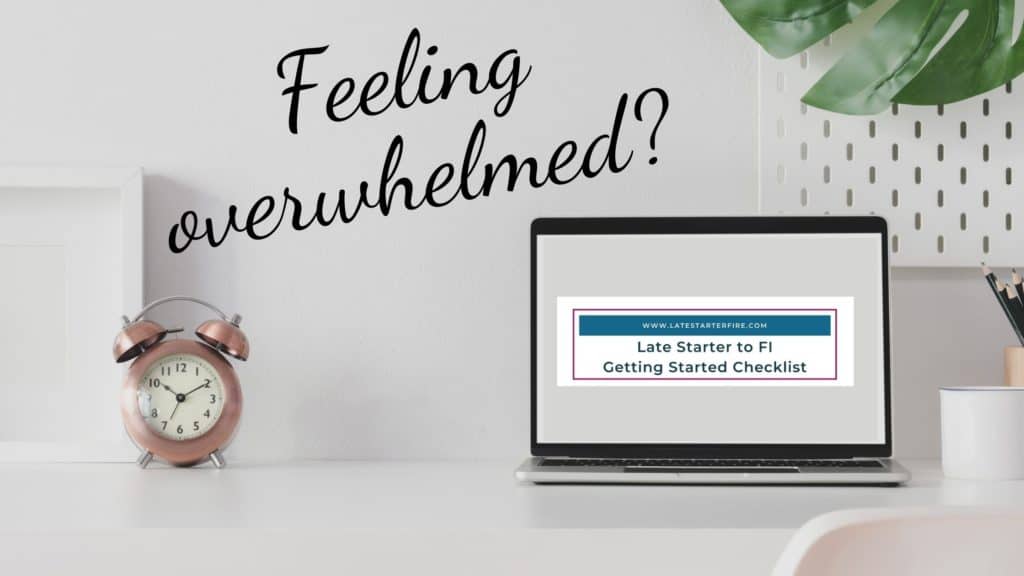Welcome to the Late Starter to FI series!
I am a Late Starter – I did not discover FIRE (Financial Independence Retire Early) concept until I was 47. This was way later, I thought than others who seem to have it all together in their 20s and 30s.
Since I started to write about my own journey, I have discovered there are many more Late Starters like me, yay! It is such a relief knowing I am not alone.
I want to share our stories, our unique perspectives and show that it is absolutely not too late for us.
So in this series, I particularly highlight those of us who start our FI journeys in our 40s, 50s and 60s. And explore questions such as ‘where do we start’, ‘can we still retire early(ish)’, ‘what are the specific challenges for us late starters’. We look at how we arrived at this point in our lives and what the future holds for us.
Please join in the conversation in the comments below. I encourage you to share your story if you fit the profile of a late starter. You absolutely don’t have to be a blogger or podcaster to share your story. Please email me at info@latestarterfire.com or connect with me on Twitter, Facebook or Instagram
Disclosure: Please note that I may benefit from purchases made through my affiliate links below, at no cost to you
Today, I welcome Fire For One from Queensland, Australia. She blogs about an “older single’s journey towards Financial Independence Retire Early”, a theme that resonates with me 🙂 She is interested to see how the journey will pan out for a single person pursuing FIRE as often it seems that almost everyone pursuing FIRE has a partner or family.
You may connect with Fire For One on Twitter too.

A little about me
I’m a single, child-free woman in my early 50s, living in Brisbane, Queensland. I was born in New Zealand and lived for about 18 months in Papua New Guinea before my family moved to Australia in late 1980.
I’ve been a choral singer for approximately half my life, although this year I gave up the semi-professional choir that I’d been singing with for over 20 years. I can’t put my finger on why, but I’d reached a point where I no longer looked forward to each week’s rehearsal – that’s when you know you need to walk away.
Other than that, I’ve always loved to read, especially fantasy and speculative fiction, with a smattering of ‘chick lit’ thrown in for good measure (not Mills & Boon bodice-rippers, though!)
My other love is cats – big, small, I love them all. Their bright eyes, their intelligence, elegance and grace, and their playfulness are just a delight. Sadly, I recently lost my own beautiful girl. She had just turned 21 but had declining health due to age. I may get another cat at some point, but I have some travel coming up in the next 18 months, so I’m holding off.
If I win the Lotto though, I have plans to start a cat sanctuary for stray cats (if I can find an appropriate property and get council approval – Brisbane City Council are cat haters).
My first real job was with Australia Post, where I worked my way up to being a Postal Manager before I quit to go to university and do my music/education dual degree. However, teaching didn’t work out for me, so a brief series of temp jobs led to my current employment.
I now work for the State Government as a system administrator and trainer for one of my department’s corporate databases.

Feeling Overwhelmed?
Use this FREE Checklist to start your journey to Financial Independence
Not one lightbulb moment
At the time I first discovered the Barefoot Investor in early 2017, my superannuation was not too bad after 10 or so years of State Government employment. But I had no savings and was feeling like I couldn’t get ahead financially, despite having spent a fair amount of this time doing higher duties.
Having a redraw facility on my home loan was probably the number one reason for this – I used to spend without much thought (on a credit card), and this habit ate up whatever savings I was accumulating through having my full pay put into the loan to save on interest.
I’d also managed to kill my car’s engine in 2007 so needed a new car. Plus I owed my Dad some money. And had refinanced my home loan at that time to include paying for these.
Don’t get me wrong – I was always able to pay the credit card bill. I wasn’t an over spender when it came to my regular expenses. But I did have a clothing habit that I had to break. Taking a ‘retail-free’ year in 2016 finally put paid to my shopping hobby. But the lack of financial security was weighing on my mind, and I was really fed up with having a home loan still, after so many years.
I think the thing that really got me thinking about my financial situation, though, was the three years that the Liberals were in power in Queensland, under Campbell Newman, which I wrote about here.
For those of us in the Queensland public service, those three years were frightening and horrific. Due to the massive job cuts, there was almost no opportunity for promotion. Or even to move to another department, as anyone who had a permanent position clung to it like a limpet to a rock.
Looking back now, those years felt like a war of attrition; people basically battened down the hatches and bunkered down to wait for the next election.
Being faced with the very real threat of losing my job for no reason other than “Can-Do” Campbell’s spite made me realise how precarious my lack of financial security was. The relief across the entire public service when the Liberals were routed in the 2015 election was palpable.
Discovering the FIRE community
I discovered the FIRE movement relatively recently through my Barefoot Investor membership. From memory, someone had posted a link in one of the forum discussions to an article by either Strong Money Australia or the Aussie Firebug, and that was the start of my tumble down this particular rabbit hole!
The comments section on the article provided links to other blogs, which led to yet other blogs. I’ve actually had to limit what I read because it becomes a bit overwhelming. I’ve tried to stick with mostly Australian bloggers since they are more focused on local issues.
FI appeals to me because, being single and having no children, I don’t have anyone to look after me when I reach a point where I can no longer look after myself. Well, I have a niece but she’s now a young single mum; she’ll have her own mum to look after, and I don’t want to be an added burden for her.
Taking the first steps on the FI path
My first step towards financial independence was to sit down and start documenting a financial plan. Taking a proper look at how much I needed to pay my regular bills and living costs over a year was instrumental in my getting my financial act together. Because it made me realise that I needed to pay a lot more attention to my spending.
Setting up the Barefoot Investor buckets* after reading the book was the next thing I did – I love a system that I can ‘set and periodically review’.
The other aspect of the plan was to set some goals, so that I had something concrete to work towards.
*The Barefoot Investor’s money management system has 9 steps. Step 2 is to set up 3 buckets to divide your income into –
(1) Blow bucket – for daily expenses, the occasional splurge and some extra cash to fight financial fires
(2) Mojo bucket – basically an emergency fund
(3) Grow bucket – to build long term wealth and total security
My relationship with money
My relationship with money hasn’t ever really been bad; I’m not a gambler (other than the occasional lotto or raffle ticket), nor have I ever been a party animal, so I’ve never spent huge amounts on going out. I’ve been lucky enough that I’ve always been in a position where I’ve been able to support myself, so I don’t actually know what it’s like to be poor/broke (touch wood).
The primary change for me in the past few years is that I’ve finally taken charge of my finances and I have specific goals that I’m working towards. If I could tell my 18 year old self a few things, though, I’d be in a much better position now! I would definitely have told her to pass on the multi level marketing schemes and let her know about FIRE! And to take a much stronger interest in IT. And to avoid the dotcom disaster. And to buy Bitcoin when it first started and wait until it hit $20,000 a coin to sell 🙂
Where I am now and where I am heading
I’m a little over two and a half years into my FI journey now, if I count from when I started implementing the Barefoot Buckets system. It has made such a difference to my sense of security. Reaching my first short term Mojo goal – three months’ living expenses – gave me a real buzz. I have now saved over three months’ full pay, or a bit more than six months of living expenses.
This has allowed me to increase the excess on my house and contents insurance to reduce the premium. And the feeling of just being able to pay an unexpected bill without having to worry about where the money will come from is, as the ad says, priceless.
The other thing I plan to do after the end of this financial year is boost my salary sacrificing into superannuation up to the $25,000 cap. Selling some shares this year has taken care of this year’s boost as well as offsetting the capital gains, but by the end of financial year 2019-20 I’ll be at the top pay rate for my rank, so no more pay rises unless I get a promotion. That makes it easier to work out how much extra I can put in without going over the cap.
Smashing the mortgage over the next few years is the other primary goal.
It’s still relatively early days for me, FI-wise. I don’t think I’ll be retiring early, per se, but I do hope to avoid working beyond retirement age. Although at the moment, the Federal Government apparently gives you a rather healthy bonus payment if you do – I guess it’s less costly than giving you a pension for those years.
I guess, though, in a way I will be retiring early, because it’ll be earlier than I anticipated.
Reflections on starting late
The main challenge for late starters like me is the lack of time.
The lack of time to accumulate funds for investing, paying off outstanding debt, for boosting superannuation and simply for learning about the world of finance.
Superannuation funds tend to push us into more conservative investment mixes (another thing I intend to delve into sooner rather than later), further hindering the opportunity to grow wealth.
The only way to compensate for this is to find ways to increase your income (not that I’ve done this yet other than through being promoted a couple of years ago), decrease expenses (I’m working on it), and learn enough about investing to make good choices – ones that aren’t so risky that you’d lose your dough, but not so conservative that they won’t provide the income and growth we need.
The advantage of starting late, though, is that I think we have more patience and are less likely to get sucked into BS money making schemes (multi level marketing, anyone? – and yes, I’ve been there too, when I was young and stupid)
Our knowledge of the ups and downs of the past provides us with the understanding that, should things go pear shaped, they will eventually return to normal, making it (hopefully) easier to resist the pull of the herd.
What's next?
So where to from here? As previously mentioned, getting rid of the mortgage is my short to medium term goal. And then after that, I want to start investing outside of superannuation.
I also need to start thinking about where I want to live when I do retire.
And I really need to take a few holidays!
Latestarterfire comments
Thank you, Fire For One for sharing your story. As a single woman myself, I totally resonate with your wanting to be financially secure because there is no one to look after us in our old age.
Working in the public service sector was always a sought after job in my days. It goes to show that the most secure of jobs may not be that secure after all. I do remember Campbell Newman’s time in office – he made the news in Victoria too.
But the good thing that came out of that period was to motivate you to seek financial security. And now you are on the FIRE path!
I love your cat sanctuary idea – wouldn’t it be great if your dream came to fruition! And it would be an awesome project for retirement … just saying!



